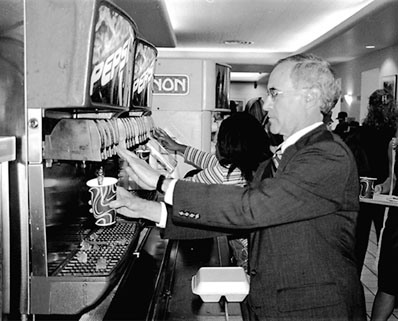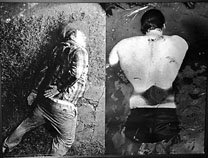By Justin Roche staff reporter When Terry Bradshaw put her purse in a Moudy Building North closet on Thursday, she never imagined her car and credit cards would end up in Lubbock. But on Sunday Bradshaw, administrative assistant to the dean of the College of Fine Arts and Communication, was informed that two 19-year old males had them in their possession. Michael Shane McNeal and Leon Jermaine Turman Jr. were arrested at South Plains Mall in Lubbock Sunday after they attempted to use Bradshaw's credit card in a store, Lubbock police said. The two men were charged with unauthorized use of a vehicle. Turman was also charged with credit card abuse, failure to show ID to police and evading arrest. The two suspects charged more than $600 on Bradshaw's credit cards from Thursday to Sunday, Bradshaw said. Bradshaw said the theft of her purse, which contained her car keys and wallet, was very disturbing. "I reached into the closet, and my purse was gone," Bradshaw said. "You always think, 'It could never happen to me,' but it definitely can." Bradshaw said her office was unattended for about 10 minutes, but that was enough time for the thief to enter, take the purse and get out without being seen. The theft of Bradshaw's purse was the fourth incident of theft in both Moudy buildings since Sept. 16 and the 13th incident on campus this semester, according to TCU police records. The number of thefts this semester is one more than the total number in August and September 1998. TCU Sgt. JC Drake said the biggest contributor to theft on campus is opportunity. "If a thief sees that something could be easily stolen, like a back pack, and there's nothing stopping him, then there's a greater risk of it being taken," Drake said. In order to combat this availability, Drake said students should change their mindset about how they care for their possessions.
Justin Roche
By Tealy Dippel staff reporter He could have had a hamburger and fries, but the line was too long. Instead, Chancellor Michael R. Ferrari opted for a chicken tender dinner in The Main as he discussed the growing problem of long lunch lines with Faculty Senate chairman Roger Pfaffenberger and Sara Donaldson, House of Student Representatives Academic Affairs Committee chairwoman.
During their lunch-time adventure, Ferrari and Pfaffenberger waited in line with about 42 students at noon, the Main's busiest time of day. "This is a zoo," Pfaffenberger said. "This won't work if you have a 1 p.m. class because by the time you find a seat and wolf down your food, it's time to leave." Once Ferrari paid for his lunch, he scanned the room in search of a vacant table. He finally found a booth, close to the entrance. "It's clear there are not many tables," Ferrari said. "We were just lucky to get one." Donaldson said of the 408 mid-day classes, about 77 are noon classes. Numbers taken from FrogNet indicate that between 11 a.m. and 1 p.m., close to 81 percent of the student body is eating lunch on campus, Donaldson said. Donaldson conducted a survey in Spring 1999 to find out how students felt about the overcrowding. "I wanted to find out if noon classes were a problem for the entire student body or if it was just something I thought was problematic," she said. The results indicated that students were in favor of taking noon classes: 868 students replied yes, 165 said no, and 51 students said they didn't care about classes. Sean Crotty, a freshman premajor said he wouldn't mind taking a noon class, but he could not go all day without eating lunch. "(Noon) classes are cool, as long as you can eat sometime," he said. Joe Carpenter, a freshman radio-TV-film major, said he doesn't mind the lines. "You always see people you know," he said. Ferrari said he thinks it is a good idea to start a movement increasing the number of noon classes. He said he will consider holding a meeting with Registrar Patrick Miller to discuss scheduling changes. Ferrari said he would like to see some improvements made for the spring semester. "If people are generally supportive, we should start working on it," he said.
Tealy Dippel
By Carey Hix staff reporter Sculptures that are both chaotic and structured, color and black-and-white photographs that range from benign to disturbing and other mixed media submitted by artists living within the Dallas/Fort Worth area can currently be viewed at the J.M. Moudy Exhibition Hall in Moudy Building North. The 17th annual Art in the Metroplex exhibition, sponsored by TCU and the Templeton Art Center, is being held now through Friday. The exhibit, featuring the art of four TCU students, is open to the public from 11 a.m. to 6 p.m. Monday, 11 a.m. to 4 p.m. Tuesday through Friday and 1 to 4 p.m. Saturday and Sunday. Admission is free. "This is one of the best shows we've had in several years," said Ronald Watson, chairman of the art department. "The quality of the work is really quite outstanding. To have work in the show is very gratifying, because it's a hard show to get into."
Awards for works range from $100 to $1,000 and were announced Sept. 18.Although no TCU students won awards for their work, the exhibit was a wonderful opportunity to get experience and exposure, said Martínez de Audirac, a graduate student in studio art whose work, titled "Censura," is featured at the show. "I'm really happy that three other students from TCU got in because that means we have a great academic level of fine art at TCU," she said. Watson, members of the TCU art faculty and the Templeton Art Center selected Clint Willour, the executive director/curator of the Galveston Arts Center, as juror. Willour chose from blind slides which works would be exhibited. "We always choose jurors that have national prominence, who have very good reputations," Watson said. "(Willour's) really knowledgeable about the art in this region of the country, and we thought it would be very interesting to have someone who's got a lot of experience with the southwest as the juror." A prospectus is sent to artists in spring, and they may submit a maximum of three slides of their original works to be registered, Watson said. The Templeton Art Center helps to compile the slides and sends them to Willour. Excellence was the main criteria in choosing the slides, Willour said. "It has to speak to you in some way that makes you want to put it in an exhibition," he said. "It has to make me think about the world in a different way. It doesn't have to deal with content. It can just be that it's beautiful in a way I haven't seen." The viewing public can expect to see a broad display of art at the show, Martínez de Audirac said. "There's a variety of techniques and sizes of work," she said. "The public can see a great variety of themes, figurative and realistic, as well as very abstract works. "I think it's a really good show. I'm glad that (the juror) chose many works of culture."
Carey Hix
By Tealy Dippel staff reporter Members of the Academic Affairs Committee of the House of Student Representatives and the Faculty Senate will discuss and debate issues relating to campus life during a forum, titled "Speak Your Mind," at 7:30 p.m. Tuesday in the Student Center Ballroom. The forum, which is expected to draw about 100 students and 20 faculty members, will include an informative session to discuss such topics as increasing the number of noon classes, changing the final exams schedule, installing FrogFinder - a new tool to help students find information about professors before enrolling in classes - and deferring Greek Recruitment, formally referred to as Rush. Faculty Senate bylaws require a joint Faculty Senate/House assembly each fall, and students involved in leadership programs, several campus organizations or the resident adviser program will be awarded points for the Intramural Participation Cup competition. "If students are going to be leaders at TCU, they need to get involved in discussions such as these," said Roger Pfaffenberger, chairman of the Faculty Senate and a professor of finance. In Spring 1999, Sara Donaldson, chairwoman of the Academic Affairs Committee, sent out surveys by e-mail to gather feedback from students about noon classes, changing the finals schedule and FrogFinder. "We want the opinions of the student body, not just a small group of people," she said. Donaldson found in her survey that 868 students out of about 1,400 surveyed said they wanted to take noon classes. Those who responded to the survey regarding the finals schedule answered in favor of a new schedule: 801 said yes to a new schedule, 279 said no, and 19 said they didn't care. "We had an incredible response for a student survey," Donaldson said. "Students want to see something happen." FrogFinder, which passed a Faculty Senate and House vote in Spring 1999, will also be discussed at Tuesday night's forum. "(FrogFinder) would cut back on people dropping classes," Chancellor Michael R. Ferrari said. "I think it's a great idea." Pfaffenberger said he has received many phone calls and e-mails about deferring Recruitment to the spring semester, another topic to be debated Tuesday. The topic first arose after Faculty Senate's Student Relations Committee conducted a student survey, and deferring Recruitment was the No. 1 issue on surveys, Pfaffenberger said. "I would say there is student interest, not necessarily moving it to the spring, but doing something to minimize the negatives associated with Recruitment in terms of timing," Pfaffenberger said. Faculty members would also like to see Recruitment delayed, he said. "(Delaying Recruitment) would let freshmen have their first semester at TCU to get their feet wet academically and not be overwhelmed with the pressure (of Recruitment)," Pfaffenberger said. In other House business, members will debate Bill 99-16 at 5 p.m. Tuesday in the Student Center, Room 222. Jason Cordova, chairman of the Elections and Regulations Committee, said the bill passed his committee's meeting Thursday with minor changes.
Staff reporter Matt Stiver contributed to this report.
Tealy Dippel |
| The TCU Daily Skiff © 1998, 1999 Credits |
 Wednesday's lunch date was scheduled by Donaldson to discuss
the possibility of increasing the number of noon classes, a proposal that
Ferrari said he will now consider. Scheduling more noon classes was a suggestion
by the Faculty Senate and Academic Affairs Committee to combat overcrowding
in The Main.
Wednesday's lunch date was scheduled by Donaldson to discuss
the possibility of increasing the number of noon classes, a proposal that
Ferrari said he will now consider. Scheduling more noon classes was a suggestion
by the Faculty Senate and Academic Affairs Committee to combat overcrowding
in The Main. Works were submitted by TCU art students Matthew R. Vanmoorleghem,
Julia Franklin, Adriana Martínez de Audirac and John Frost.Watson,
who created the exhibit in 1982, said the show is much larger than previous
exhibitions, with 58 works instead of the usual 35.
Works were submitted by TCU art students Matthew R. Vanmoorleghem,
Julia Franklin, Adriana Martínez de Audirac and John Frost.Watson,
who created the exhibit in 1982, said the show is much larger than previous
exhibitions, with 58 works instead of the usual 35.